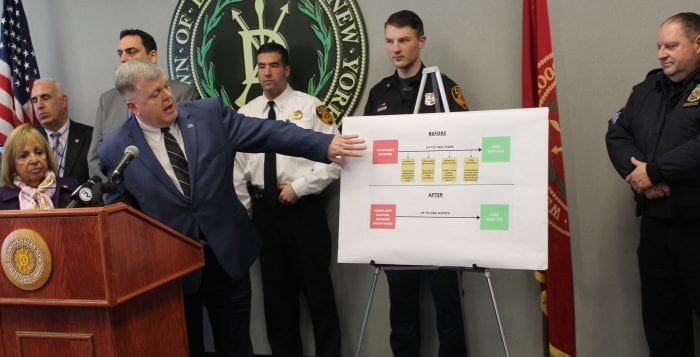LI Supervisors Call on State to Exempt Municipalities from Discovery Law

Town supervisors in Suffolk County say recent criminal justice reform has caused “unintended consequences” to municipalities and local code enforcement. They are asking the state to exempt small municipalities from new guidelines, among other things.
The issue they have is with the state’s new discovery provisions, which require names and contact information for complaints to be turned over within 15 days of arraignment. In turn, it has eliminated anonymity, which many municipalities rely on when it comes to handling code violations.
“You’re not going to call, you’re not going to complain, what does that do for the quality of life?”
— Ed Romaine
Rich Schaffer (D), Town of Babylon supervisor and chair of the county Democratic committee, said at a March 5 press conference they usually receive a lot of anonymous tips from concerned residents but have noticed many are not willing to come forward with the new changes.
“They don’t want to put their names down, and quite frankly we don’t want to [either],” he said. “We want to be able to go after the offenders and educate them on how to clean up their act and be a good neighbor.”
A letter signed by all of the county’s town supervisors was sent to Gov. Andrew Cuomo (D) in January. The group said with the new standards in how case information is turned over to the courts, it means there are currently no distinctions between a homicide case and a “municipal code violation for high grass.”
The supervisors said the reform was rushed through the legislature and didn’t give municipalities enough time to formulate a public education campaign. In addition, the changes hurt them on a local level because the state “got involved in things that we didn’t need their involvement in,” Schaffer said.
Supervisors also complained the requirement for after issuing a summons, a court date must be set within 20 days. Officials said it used to take a month to process cases, but now there are four additional “hoops to jump through” to process a complaint. A case could take up to two years to be resolved.
Town of Brookhaven Supervisor Ed Romaine (R) said the criminal justice reform has had a “chilling effect on code enforcement.”
“So now, if you live next to a guy that has a house with two illegal apartments and four or five unregistered vehicles and trash on the property, if you call, we are obligated by state law to tell the guy next door that you called,” he said. “You’re not going to call, you’re not going to complain, what does that do for the quality of life?”
The four supervisors called on the state Legislature to pass a bill that would allow townships to handle their own code enforcement cases and reinstate anonymity.
State Sen. Jim Gaughran (D-Northport) and state Assemblyman Fred Thiele (I-Sag Harbor) are proposing bills that would allow anonymity for those reporting local code violations, let municipalities take these cases out of district court and allow them to create their own administrative bureau.
Chad Lupinacci (R), Town of Huntington supervisor, said many of the problems discussed can be eliminated if municipalities had their own administrative bureau. Huntington is one of three municipalities in the state to have one.
“The bureau should be up and running sometime in May,” he said. “Code enforcement officers, instead of having to comply with these changes, will be able to just enforce the code and ensure that neighborhoods are safer.”
Brookhaven assistant attorney David Moran said they will work in compliance with the law but called it an “unfunded mandate” with no real direction given how to be in compliance.
Schaffer said he’s volunteering Babylon to be the guinea pig regarding not following the new law and seeing what comes out of it.
“I’d like to be the test case to challenge the system,” he said.






